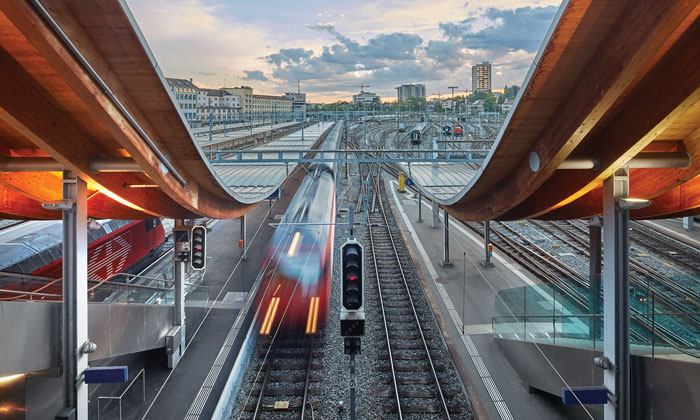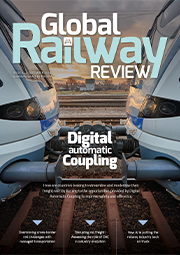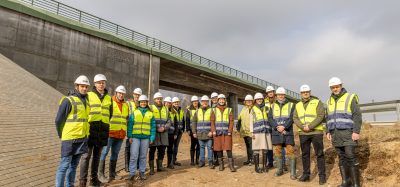The Swiss approach to traffic management optimisation
Posted: 10 May 2017 | Yves Zischek (General Programme Manager of SmartRail 4.0 - SBB) | No comments yet
SBB is banking on its own innovative capabilities to ensure its rail services on Europe’s busiest network are safe, reliable and punctual. In this article for Global Railway Review, Yves Zischek, SBB’s General Programme Manager of SmartRail 4.0, explains that it has set standards with its assignment and control systems – and intends to continue doing so in the future.


The growing traffic volumes are accompanied by rising demands on rail services in terms of safety, reliability, punctuality and stability, while network capacity is simultaneously reaching its limits.
To ensure its rail services are safe, punctual, efficient and offered at competitive prices both today and in the future, SBB is relying on the success factors of its traffic management, train monitoring systems and digitalisation.
Traffic management with predictive train assignment and adaptive control SBB has developed its own Rail Control System (RCS) for the assignment and monitoring of railway operations. A range of applications can be added to RCS, making it well equipped to deal with present and future challenges.
RCS-Dispo is Switzerland’s leading assignment software – and it is not just SBB that relies on it, but the country’s second and third largest railway companies as well.
RCS-Dispo brings together information relevant to rail services from various systems in a standardised user interface. Every two seconds it calculates a status forecast for the entire Swiss track network – projections that can extend as much as 90 minutes into the future. Although this forecast covers some 4,000 trains, calculation takes no more than a second.
RCS-Dispo also detects occupancy conflicts between trains that want to use the same track and automatically suggests possible means of resolution. In addition, the system detects turnaround and connection conflicts. The options of automated traffic control are extended by two supplementary modules: RCS-ADL (adaptive control) provides engine drivers with recommendations to ensure they drive in a smooth and energy-efficient manner that is easy on resources; and RCS-HOT (Hub Optimisation Technology) which optimises train management at problematic points, such as Zurich’s western entrance. The RCS system family with RCS-ALEA (alarm and incident assistant) provides a communications channel for reporting incidents that occur on the network.
Safer trains thanks to train monitoring systems
On SBB’s busy track network, irregularities affecting passenger or freight trains can quickly result in delays and disruption. Such risks are minimised by monitoring trains and high-risk sections of the rail network. More than 204 train monitoring systems (ZKE) throughout SBB’s network offer safety relevant functions to detect profile clearance and aerials, fire and chemicals as well as hot box and brake-locking. Monitoring also includes load displacement, overloading and wheel defects, in addition to natural hazards. Availability-relevant inspections, such as wire uplift measurements and dragging equipment detection (DED), are also performed here. The two wheel-load checkpoint monitoring systems were developed in-house by SBB to identify load displacement, overloading and wheel defects as well as to detect fire and chemicals.
The full integration of RFID systems permits clear-cut identification of vehicles and reliable and traceable assignment of the measured data to the individual wheel sets.
The specially developed ZKE network IT application acts as a realtime monitor and permits the necessary intervention based on instant location-independent data analysis (e.g. stopping trains or reducing their speed). All alarms and interventions are also captured in a database, with the information being forwarded to the railway undertakings concerned in order to optimise maintenance.
This makes SBB a benchmark throughout Europe in terms of train monitoring. Every day it monitors 10,767 trains, with ZKE registering even the tiniest deviations 25,000 times a day. Such consistent monitoring is reflected in the higher train-path availability levels. Since 2007 there have been no derailments due to hot box or brake-locking, and hundreds of thousands of minutes of delay have been avoided thanks to ZKE.
SmartRail 4.0 – the rail services of tomorrow
With the ‘SmartRail 4.0’ programme, SBB is taking a strategic step towards a digital future – in line with ‘Industry 4.0’. SBB is safeguarding its levels of performance, long-term appeal and competitive ability with a sophisticated strategy of further development extending until 2040.
The SmartRail 4.0 programme allows SBB to exploit the diverse digitalisation, automation and technology potential offered by timetable creation, rail operations and train control while also exploring the possibility of increasing remote train control. SmartRail 4.0 focuses on systemically supported, continuous timetable creation, further development of management and control systems for rail operations, new digital signal boxes, a reduction in equipment variety with safety installations, roll-out of the ETCS cab-signalling system throughout the network, expansion of data transmission capacity and precise detection of trains in the station throat.
Furthermore, customers directly benefit from SmartRail 4.0. SBB is aiming here for a significant decrease in headway times in the medium-term, thus boosting capacity thro ughout the network. This means that in future more trains will be able to travel on the existing infrastructure. Simplification of the systems increases availability of the safety installations, resulting in reduced disruption and better punctuality.
Upgrading the data network will allow passengers to make uninterrupted phone calls and surf the Internet faster. Cutting-edge signal box and location identification technology can further improve safety when shunting and on construction sites. In the event of disruptions, harmonised production systems also ensure passengers benefit from improved customer information. SBB expects SmartRail 4.0 to bring about a significant reduction in costs by 2035.
Biography
Yves Zischek has been the General Programme Manager of SmartRail 4.0 since 1 January 2017. He joined SBB in 2013 and previously headed up the Telecom Unit in its Infrastructure Division. Yves completed a Master of Arts at the University of Zurich, followed by a Master’s degree at the University of Strathclyde in Glasgow. Over the last 20 years he has held various management roles in the telecoms and IT sector.
The rest of this article is restricted - login or subscribe free to access


Why subscribe? Join our growing community of thousands of industry professionals and gain access to:
- Bi-monthly issues in print and/or digital format
- Case studies, whitepapers, webinars and industry-leading content
- Breaking news and features
- Our extensive online archive of thousands of articles and years of past issues
- And it's all free!
Click here to Subscribe today Login here






